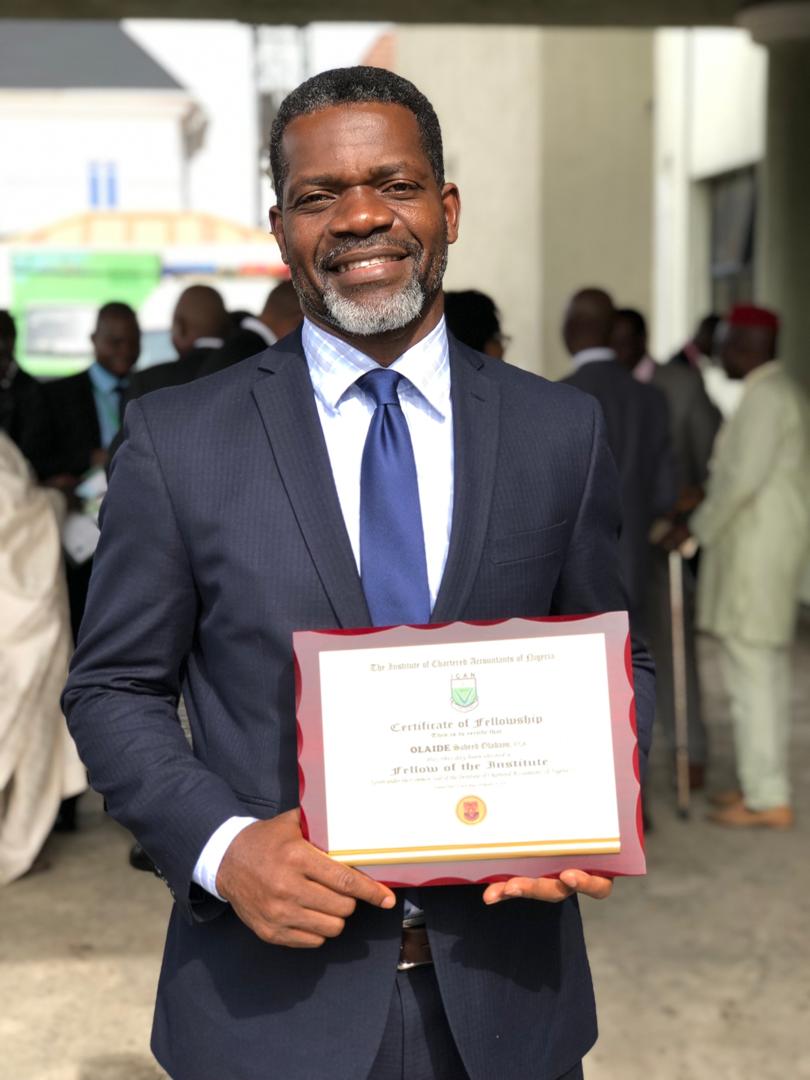Brain drain | The Making of African Migration
By Elizabeth BanyiTabi, Emmanuel Mutaizibwa, Ngina Kirori, Theophilus Abbah and Brezh Malaba
Key points
-
Nine out of ten Nigerians said they want to “escape”
-
“Frustration of excellence” is behind an exodus of doctors, IT experts, and teachers
-
Academics leave behind silenced and empty campuses
-
Oppression drives many to “vote with their feet”
The extremely heavy traffic during weekdays on Zakariya Maimalari Street and Muhammadu Buhari Way in the central business district of Abuja, Nigeria, is largely caused by the stream of young men and women who park their cars on walkways to enter the visa application centres here. The parking lot for visitors to the VFS Global visa company, located on multiple floors in the Sterling Bank edifice on Muhammadu Buhari, has long ceased to be sufficient to accommodate the overflow of applicants. The same goes for the parking at VFS’s competitor TLSContact, which occupies the third floor of the gigantic Mukhtar El-Yakub Plaza on Zakariya Malari.
Hundreds want to “japa” daily
The hundreds of would-be travelers here are qualified health personnel, IT experts, accountants, and other professionals. They want to “japa”, as the phenomenon is called in Nigeria, a Yoruba word that roughly translates to “escape” or “run away”. Motives to japa, expressed by the people in the queues to ZAM reporter Theophilus Abbah, vary from the high unemployment rate, put at about 41 per cent of the working age bracket, and the extreme poverty affecting 133 million out of a 200 million population, to corruption and misgovernance by an extremely wealthy elite. Many say they don’t have any hope for change, certainly not in the near future. Last February, much-disputed elections once again brought an ailing, aged autocrat – Bola Tinubu, 71, whose first act in office was to fly to France for medical treatment – to power in this country. In recent years, protests for social justice and human rights in Nigeria have also been violently suppressed.
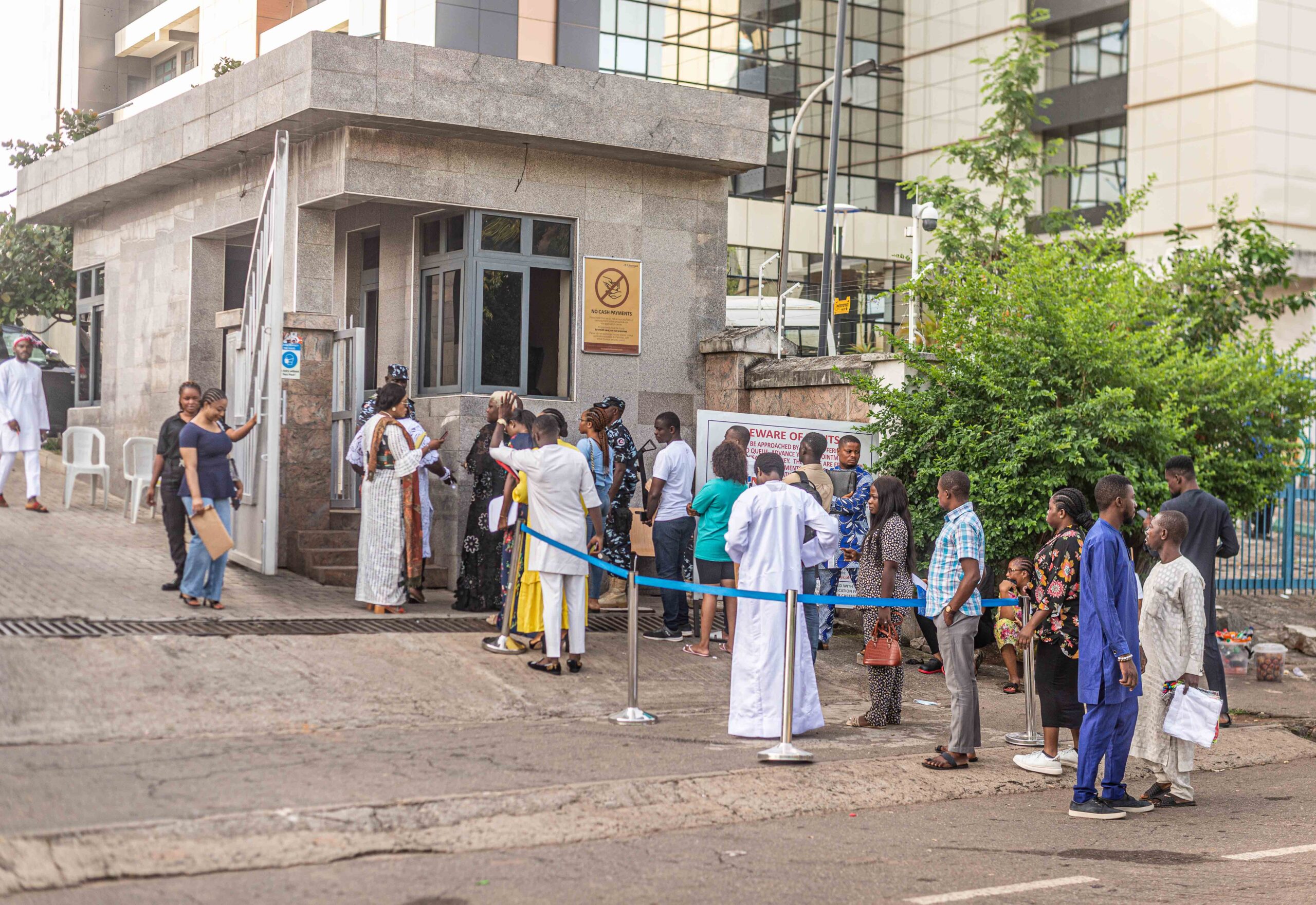
Visa applicants stand in line, anticipating entry into the visa office in Muktar El Yakub Plaza Abuja. Photo by David Exodus
In the view of Nigerian doctor, former government advisor and health advocate, Dr Ejike Oji, it is specifically “the frustration of excellence” in a system that is based on patronage instead of competence that chases professionals away. “Appointments (here) are not based on merit. Persons who are qualified are bypassed in favour of the children of the rich, politicians, and elite. Those discriminated against (therefore) have to find other means of survival, and that includes embarking on the journey to Europe and North America to work,” he says.
Harare, Zimbabwe
Voting with their feet
Among the thousands of young people queueing for passports at Makombe Building, the headquarters of Zimbabwe’s National Registry on the fringes of central Harare, many step away as soon as we introduce ourselves as journalists. “I don’t want to get into trouble. They will deny me a passport if you take a picture of me here,” says a lady in her mid-20s, shielding her face from view. Others tell reporter Brezh Malaba that they fear being arrested if they talk. As per 23 December 2022, when the Criminal Law Codification and Reform Amendment Bill, commonly referred to as the Patriotic Bill, was published in the Government Gazette, it is a crime to “wilfully injure the sovereignty and national interest of Zimbabwe.” This includes being critical of the government.
I don’t want to get into trouble
Those who do open up about their personal situation only do so on condition of anonymity, but their stories are all similar: they want to acquire a passport and leave Zimbabwe at the earliest opportunity.
These interviews take place months before the general election of 23 August 2023, which means that many of those gathered here will have left by then, voting, so to speak, with their feet. This will also be the only way they will express themselves, since, in spite of much pressure to the contrary https://www.theafricareport.com/305062/zimbabwe-denying-diaspora-vote-is-zanu-pf-plan-to-manipulate-poll/, Zimbabwe’s leaders are not allowing its estimated three to five million emigrés the right to vote. The government only allows this to its diplomats, civil servants, and members of the armed forces.
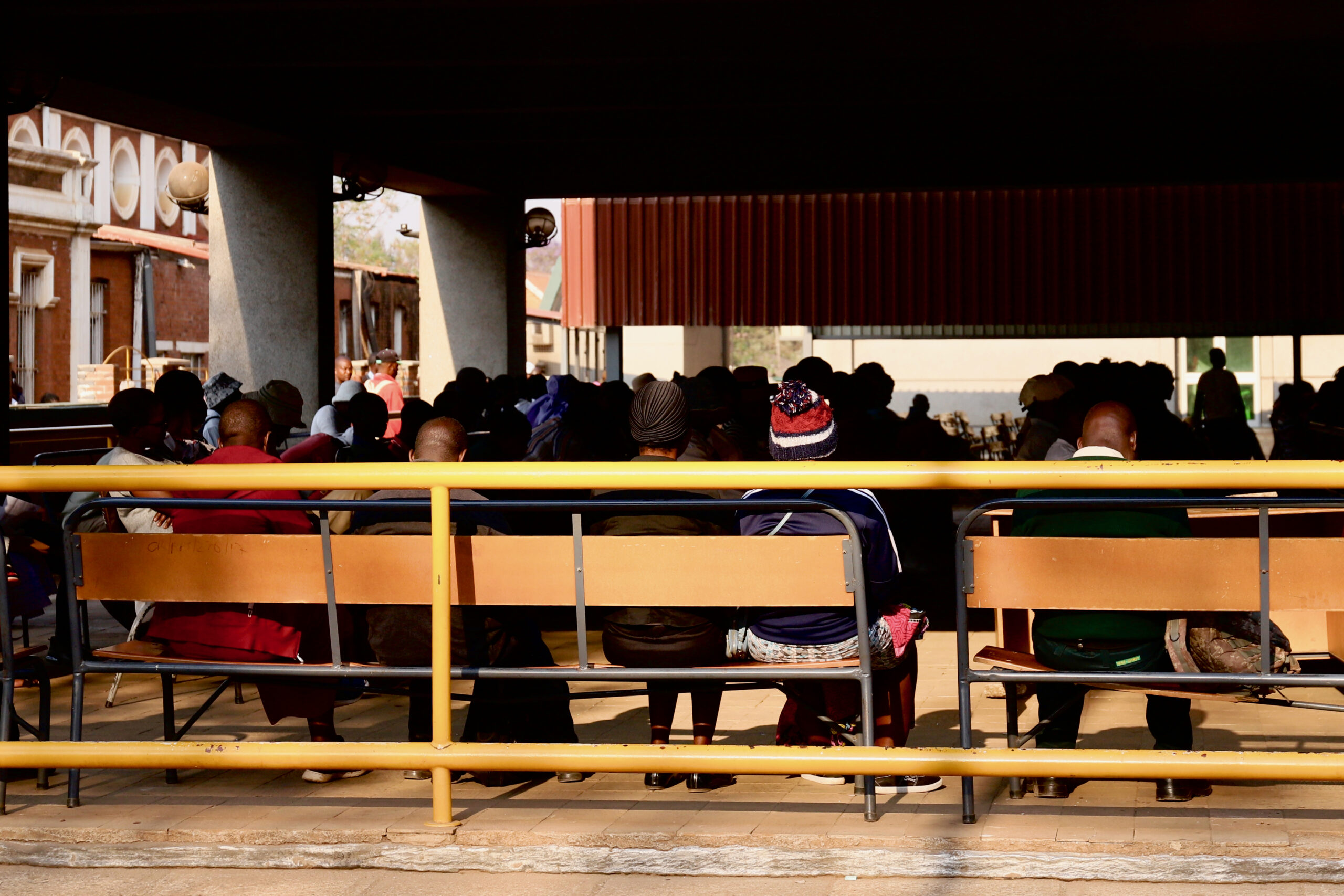
Zimbabweans waiting at the passport office in Harare. Photo by Shepherd Tozvireva
Oppression
The economical motive for leaving Zimbabwe is, even more than in Nigeria, compounded by oppression of any opposition, criticism, or activism for change in this country. Amalgamated Rural Teachers Union of Zimbabwe (ARTUZ) President Obert Masaraure and his colleagues say they have tried for years to improve the situation for professional teachers in this country. “We wrote open letters, we marched, we tried to get the government’s attention. But last year the government suddenly levelled trumped-up charges of murder against us.” The charge of murder, also levelled against Masaraure’s colleague, ARTUZ Secretary-General Robson Chere, concerns the death of a man called Roy Issa, who died in 2016 after tumbling over a hotel balcony in Harare. The charges against Masaraure and Chere are puzzling since neither of the two was ever formally a suspect in the police case and an inquest already arrived at a verdict of “death by misadventure” (link https://www.internationalmagz.com/articles/zimbabwe-militant-teachers-union-leaders-arrested-formurder). Amnesty International has released a statement saying the case is an example of political persecution https://www.zimlive.com/amnesty-international-says-masaraure-victim-of-political-persecution/.
The murder charge is only one of a series of cases levelled by the state of Zimbabwe against fiery union president Masaraure. In 2019, he was charged with “incitement” of teachers to “commit public violence” and “subverting a constitutionally elected government.” With the Roy Issa case ongoing, Masaraure had to appear in court again on 31 May 2023, this time for “tweeting a message meant to prejudice his pending trial.” (The tweet pertained to a statement Masaraure released, which encouraged the public to support Robson Chere.) Masaraure has also suffered break-ins into his home and beatings by the security forces. The two men are currently out on bail.
The trumped-up charges snuffed out the protests
In recent years, dozens of human rights lawyers and opposition activists in Zimbabwe have been arrested and put in jail, awaiting trial, on charges widely seen as ludicrous. A Google search on “trumped up charges” in Zimbabwe returns hundreds of news reports since 2017, the year when current president, then vice president, Mnangagwa came to power, ousting his previous boss Robert Mugabe in a coup.
In the interview with Brezh Malaba, Masaraure also shares a survey among ARTUZ members in which 95% said they were looking for work outside Zimbabwe. He says he fully understands the teachers who join the brain drain, since “here, you cannot feed yourself, and when you raise your voice, you’re punished. We can’t have a dignified life.” He mentions a message from a colleague who landed a job in the United Arab Emirates, saying “how lucky he was to be out of Zimbabwe.”
“It’s painful”
As the sun drenches a Harare backyard restaurant in a warm glow, public sector workers gather here to fork out US$1 for their lunch. It’s a lot for those who, like teachers, earn the equivalent of around US$300 per month, but an unlicensed eatery such as this one is still among the cheaper options. A middle-aged man donning a necktie, tucking into a piece of beef dished by the cook into a takeaway container in return for his banknote, doesn’t mind chatting about the high cost of living. Confirming to reporter Brezh Malaba that he is indeed a public servant, he admits that the situation is “painful” even to him. Contrary to official government reports, which invariably proclaim that the economy is getting better and better, the official admits that “we’re all in trouble” and that even he and his colleagues regularly “can’t afford food, rentals, or bus fare.”
Kampala, Uganda
An empty campus
In Uganda, Kampala’s Makerere University, once a vibrant debating ground for aspiring intellectuals that produced authors and scholars like Ngugi Wa Thiongo, Malawian poet David Rubadiri and Tanzania’s founder president Julius Nyerere, looks desolate. In the past decade, oppression by the Ugandan regime led by 79-year-old autocrat Yoweri Museveni has intensified. Critical academics like Stella Nyanzi https://www.theguardian.com/global-development/2022/jan/27/im-free-at-last-ugandas-rudest-poet-stella-nyanzi-on-prison-protest-and-finding-new-voice-in-germany have either left Uganda after arrest and detention, or have been silenced. Lecturers who are still here, interviewed on condition of anonymity by reporter Emmanuel Mutaizibwa, tell him they are afraid of being victimised by presidential appointees like new Vice Chancellor Barnabas Nawangwe and the new chair of the Appointments Board, President Museveni’s son-in-law Edwin Karugire. “Academics are (now) not freely expressing themselves. This, whichever way you look at it, it is inherently dangerous,” says one.
Former Makerere alumnus Dr Yusuf Serunkuma, speaking from Germany where he teaches African Studies at Martin Luther University, confirms in an interview that he, too, has noticed a “pervasive fear” among former university colleagues, adding that “the speed at which Prof Nawangwe signs letters expelling dissenting academics and students is mindboggling.” His USA-based colleague, fellow former Makerere alumnus Moses Khisa, who is now an associate professor at North Carolina State University, says he feels that this is done on purpose: “Once you capture the intelligentsia, you can rule as you want.”
You die inside as a writer and an intellectual
Meanwhile, Makerere lecturer in literature Danson Kahyana’s phone number from last year does not answer anymore. The last article by him, published in April 2022 by the Ugandan Observer, had contained a report on an assault he suffered after writing articles critical of government. He wrote that he had been trailed and stopped by men on motorcycles, who assaulted him and knocked out his teeth. In the same article, he wrote that his life had changed “in many ways” since then. “You see a potential attacker on every boda boda (motorbike taxi) that passes. But worse than the trauma is self-censorship: you die inside as a writer and as an intellectual.”
Various sources at Makerere concur that they will also leave to join the intellectual brain drain as soon as they find opportunities abroad.
Suppressed protests
Many colleagues want to leave as soon as they get their license
Also in Kampala, many young doctors, who have been trying to get the government to improve the health sector, are throwing in the towel after the police and army suppressed their protests. At least ten marches and pickets demanding better hospital conditions and payment of outstanding salaries (while a Twitter campaign called “Uganda Health Exhibition” circulated pictures of medics operating on patients on floors, and clinics without roofs) were met with beatings, teargas, and mass arrests in the past year. In an interview with ZAM’s Emmanuel Mutaizibwa, medical intern Judith Nalukwago, who participated in the protests, said that she still wants to stay in Uganda because she dreams of starting her own hospital and charitable fund to help fellow citizens, but admitted that she now saw many colleagues preparing to leave “as soon as they get their license.”
Former Uganda Medical Association president Dr Ekwaro Obuku says he estimates that 2,500 doctors out of the country’s approximately 8,000 registered medical doctors, nearly a third, have already left to work overseas in recent years.
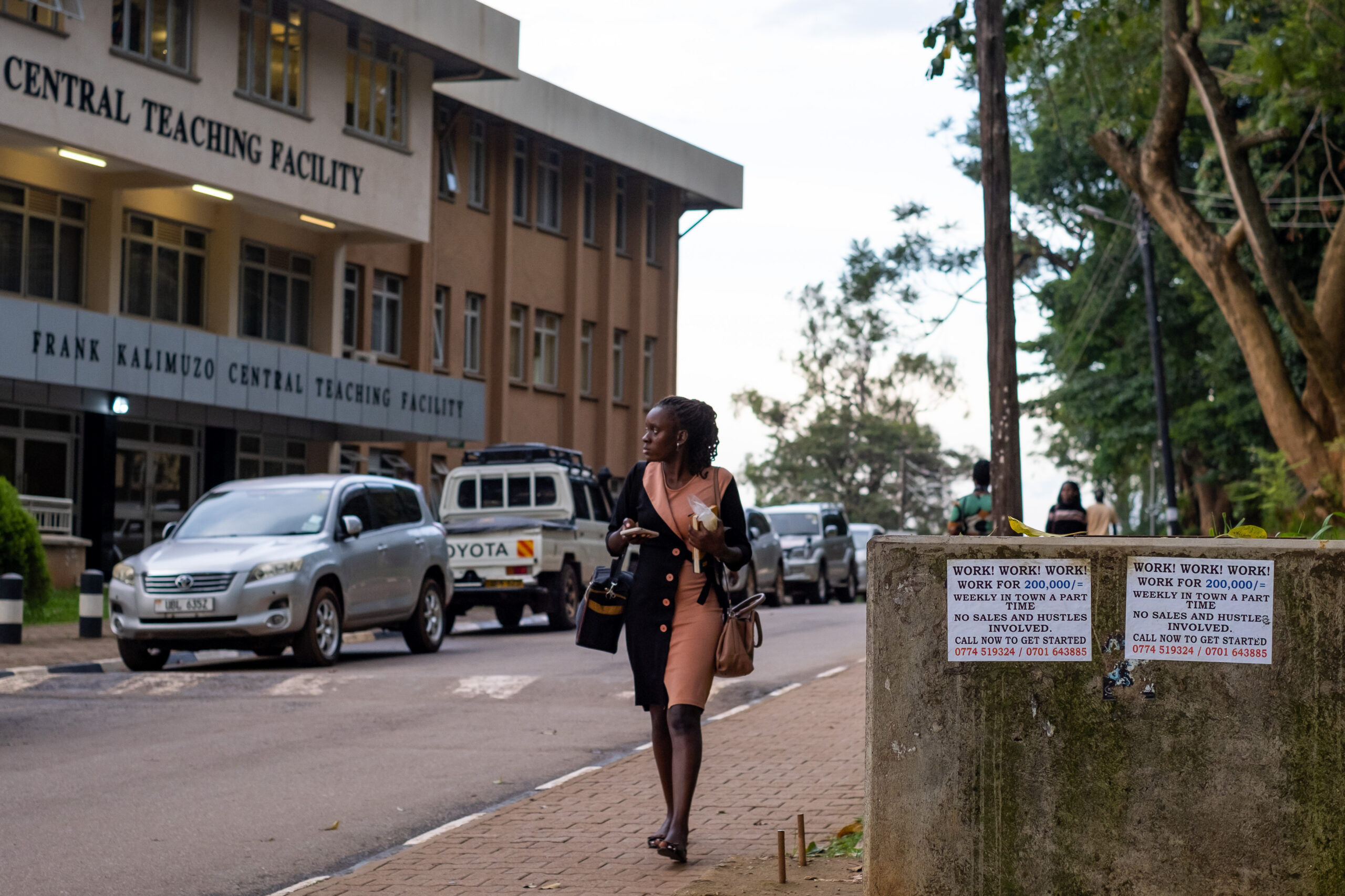
Job advertising posters pinned on the walls and boards at Makerere university campus in Kampala, Uganda. Photo by Badru Katumba
What irks the Ugandan professionals perhaps the most is the fact that the public sector remains desperately poor while, just like in the other four countries in this investigation, the governing elite lives the good life. According to news reports, President Museveni was recently personally allocated the equivalent of 350 million Ugandan Shillings, US$94,000 for bedding, clothes, and footwear for this year alone https://www.monitor.co.ug/uganda/news/national/opposition-mps-protest-museveni-shs1m-daily-expenditure-on-clothing–4239084. “The big (politicians) are enjoying the best health services. The rest of Ugandans live in abject poverty,” said a protest-tweet, one of many in the “Uganda Health Exhibition” Twitter campaign.
The big politicians are enjoying the best health services
Crocodile tears
Governments in Nigeria, Kenya, and Zimbabwe have formally expressed concern about the brain drain affecting their countries, but as yet have not taken any practical steps to improve working conditions or job opportunities for professionals. Early in 2023, Nigeria’s National Assembly attempted to pass a law that would prevent medical personnel from leaving Nigeria for work abroad until they would have served the country for a minimum of five years. The bill was shot down as “discriminatory”, a sentiment that may be connected to the fact that Nigerian MPs themselves are likely to have relatives and friends who’d like to japa. In early June, another bill to put in place measures that would halt japa was introduced in the legislature, but it did not see the light of day either.
In the same time period, Kenyan government representatives announced policies to improve the working conditions of doctors https://www.theafricareport.com/300017/kenya-taming-medical-brain-drain-by-curbing-emigration/ and engineers https://www.the-star.co.ke/news/realtime/2023-03-05-welfare-issues-leading-to-brain-drain-among-engineers-ps/, both leaving the country in droves, but none of these policies had begun to materialise at the time of publication of this report.
Zimbabwe demanded damages from countries that “poach” its medics
Zimbabwe has engaged the UN in a demand of “damages” from countries that “poach” its healthcare personnel, such as the UK, https://www.thezimbabwemail.com/health/zimbabwe-to-approach-un-to-demand-compensation-from-countries-recruiting-its-health-workers/ since 2021. Without responding directly, the UK government has since published a revised health sector recruitment code https://www.gov.uk/government/publications/code-of-practice-for-the-international-recruitment-of-health-and-social-care-personnel/code-of-practice-for-the-international-recruitment-of-health-and-social-care-personnel-in-england that says that “health and social care organisations in England do not actively recruit from those countries the World Health Organization recognises as having the most pressing health and care workforce-related challenges” (among which most African countries) “unless there is government to government agreement to support managed recruitment activities.”
Nevertheless, doctors and nurses have continued to exit Zimbabwe’s dilapidated hospitals, prompting an Al Jazeera correspondent to remark, “it is futile to blame the UK when Zimbabwe bears the lion’s share of responsibility for the crisis it now stares at.” https://www.aljazeera.com/opinions/2023/2/8/zimbabwe-is-bleeding-doctors-teachers-to-the-uk-whos-to-blame. The tears shed over doctors leaving, by a government that presides over hospitals without medicines or medical machines for doctors to work with, may to some indeed evoke the image of a crocodile, the nickname of Zimbabwe’s president Emerson Mnangagwa.
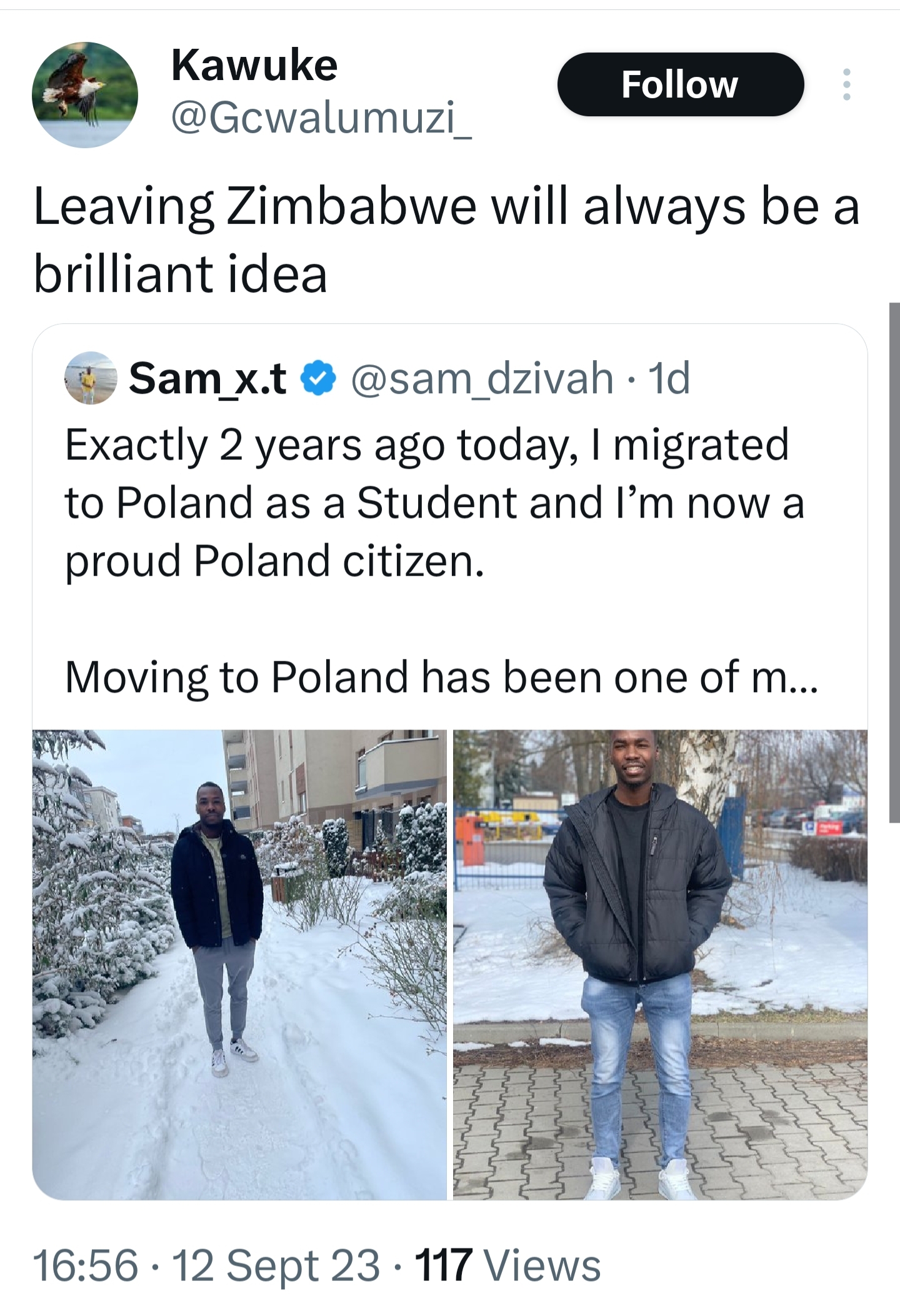
Visas can be hard to find, but for the few who can navigate the system, the reward is stability
Deaf ears
In Cameroon, opposition activist Kah Walla, who has been at the forefront of the fight against corruption and social injustice in the country, doesn’t see people coming back from abroad any time soon. “As long as we are in this regime, things will continue to get worse, and more and more people will leave,” she says. Walla expects, however, that “if we can change the regime and rebuild our country, even people who have emigrated will come back.” Her NGO, Stand Up 4 Cameroon, advocates for the international community to help local democratic forces and stop un-monitored development aid that lands in the pockets of the Biya regime. But their pleas fell on deaf ears recently when the IMF, contrary to the activists’ specific demands, again extended a big US$300 million grant to the Cameroonian government (see “The IMF is complicit” in https://www.zammagazine.com/investigations/1567-cameroon-the-truth-is-a-dangerous-business ).
How must we develop when all our brains are leaving?
This aid is meant to help African countries develop. “But how are we going to develop when all our brains are leaving?” asked one interviewee from Nigeria.
This investigation was coordinated and edited by ZAM’s investigations editor Evelyn Groenink
Read other reports here Losing hope |The Making of African Migration
Migration is not the West’s problem, it is Africa’s
Where exit is the biggest cash cow
Uganda| Between prayer and protest
Nigeria | The returnees who leave again
Paying dictators | The Making of African Migration
Cash cows | The Making of African Migration
Migration is not the West’s problem, it is Africa’s
The Insight Report
Nigeria Coverage



